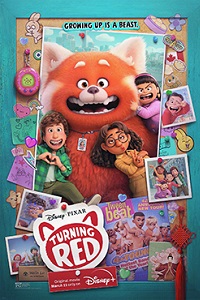♣♣♣♣/♣♣♣♣♣
13-year-old Toronto native Meilin Lee (Rosalie Chiang) is your typical teenager entering puberty. Along with her best friends Miriam (Ava Morse), Priya (Maitreyi Ramakrishnan), and Abby (Hyein Park), they spend most of their time juggling school activities, ogling the local convenience store clerk as well as fangirling over 4*Town, a popular boyband headed to Canada for a grand concert. Meilin also has to deal with her overbearing mother Ming Lee (Sandra Oh), your typical dragon mom who makes sure that her daughter is always on the top of her class and fulfilling her obligations which include assisting in the tourist tours the family temple, the oldest in town. Problem ensues when an ancient family curse manifests as Meilin suffers an emotional outburst. Apparently, their ancestor made an occult deal which allows the women in the family to turn into giant pandas when provoked. The only way to get rid of it is to undergo a ritual during the Red Moon, which coincides with 4*Town’s Toronto concert.
On behalf of everyone who is not white, fat, and/or balding, I would like to apologize for this newest travesty from Pixar. Imagine growing up in a cinematic landscape where each and every character and storyline was so about you that when unfamiliar narratives like that of a Chinese Canadian tween who turns into a panda come along, you refuse to find a universal theme such as puberty which all members of the human race should be able to relate to like any university-level Humanities course should’ve taught you to do, and instead, just zero in on gender and color as grounds for your dislike.
We will be distributing thoughts-and-prayers relief packages to everyone who is affected as long as you can point to us on this doll where Pixar hurt you. Seriously, though, what the heck is with that kind of backlash in 2022? The film’s central theme, that of turning into a giant red panda when overcome with emotions, can be interpreted in so many ways. It can be a metaphor for a girl’s monthly period if you want it to be that simple. Yet, it can represent a slew of other issues such as peer pressure, dancing with your demons instead of vanquishing them, as well as puberty and being a teenager in general.
In short, you don’t have to be Asian and a girl to be able to empathize with the main character, unless you belong in an alternate universe where you skipped puberty altogether and went straight to being a jaded adult. Personally, I don’t like the storyline, but it’s mainly because the teenage girl demographic is something hard for me to understand, especially their KPOP martyrdom. But then again, that is one of the lessons I’ve learned after watching this movie. Let tweens be tweens.
We all have various obsessions of our own that are hard to justify. If for prepubescent girls it’s swooning and going gaga over a quintet of boys who can sing and dance in perfect unison, then so be it. If that is part of their growing up process, why deny them of such? And that was my biggest takeaway from this film in lieu of unwarranted veiled criticism like it is too mature a theme for children and all that shit. Dude, girls do go through that special phase in their puberty, it’s not part of Pixar’s imagination. Making the issue taboo instead of making it part of everyday conversation does not help at all.
As for the technical aspect, it’s Pixar so we don’t really have to fear that it would be mediocre. Plot development is a bit recycled but executed in a fun way leading to a smooth transition from animosity between mother and daughter to mutual understanding, which is perhaps the perfect moral lesson for this material. If you are a mother or a daughter, you will definitely enjoy this movie. If you are a guy, use it as an opportunity to better understand women and how they deal with growing up. Empathy is key.









0 creature(s) gave a damn:
Post a Comment